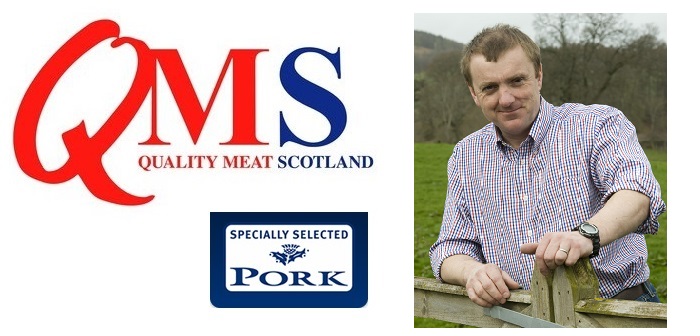Scotland’s meat promotion body, Quality Meat Scotland (QMS), has urged producers not to lose sight of the long-term opportunities which lie ahead, despite the “disheartening time” which many are currently facing.
“There will be real opportunities in the years ahead to reap the rewards of the Scottish industry’s unique selling points in a global market where there is growing demand for quality, sustainably-produced meat,” said QMS chairman, Jim McLaren (pictured above), in an update of the organisation’s 2016 programme.
Scottish production methods, he continued, were based on qualities that would “place our products in the very top price bracket in markets such as North America, yet they seem to be taken for granted by UK retailers”.
QMS Chief Executive, Uel Morton, added that the organisation’s priority, in terms of budget spend, remained that of marketing the country’s Scotch Beef PGI, Scotch Lamb PGI and Specially Selected Pork brands.
“It is important to note that over 70% of our external spend is allocated to marketing and other consumer-facing activities with less than 20% focussed on industry development activities,” said Mr Morton, pointing out that QMS’s budgeted external spend for 2016/17 year would total £5.26m, slightly up on the £5.1m spent in 2015/16.
Not surprisingly, he also mentioned levy income, which for the financial year ending March 31, 2015 was £3.97 million, down by £123,000 on the previous year.
“The loss of levy to other parts of Great Britain continues and the actual amount of levy received for the year fell short of our initial budget estimate by £52,000,” he said. “Our forecast for levy income for the year ahead, however, is £4.19m which is an increase of £215k on the year just past.”
On the issue of levy repatriation, namely the recovery of levy which QMS views as being “lost” from Scotland due to livestock being slaughtered south of the border, Mr Morton said that “welcome progress” had been made at the end of last year, following discussions with the other GB red meat levy organisations.
“Significantly, there is agreement amongst the GB red meat levy organisations that the present system of levy distribution is unfair and an alternative method should be adopted,” he said.
“However, we have to recognise the legal framework we are in and that the solution requires an amendment to legislation in England, Wales and Scotland. This proposal is currently with ministers in Westminster, Cardiff and Holyrood and we look forward to progress in the coming months.”
The QMS team, meanwhile, is working hard to bring in grants, albeit against a backdrop of tight public sector budgets.
“Grant income for the year past was £785,000, which is a great boost to our activities on behalf of the industry,” said Mr Morton. “For the year ahead, we have already secured £721,000 in grant income and are hoping to be able to confirm some further grant funding in the coming months.”




